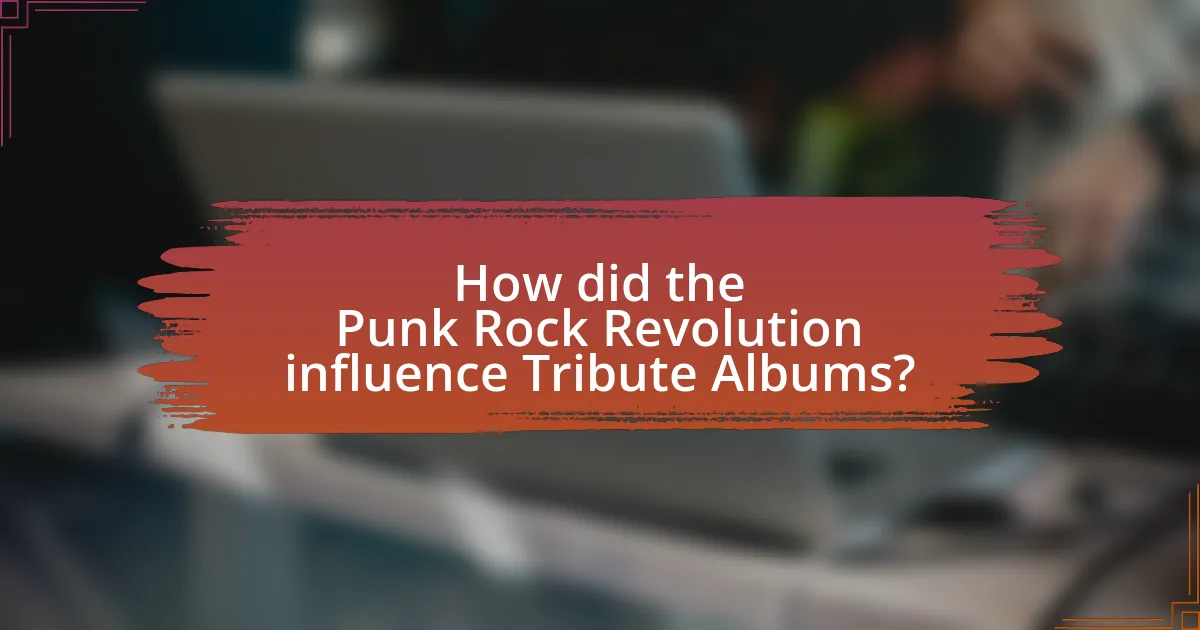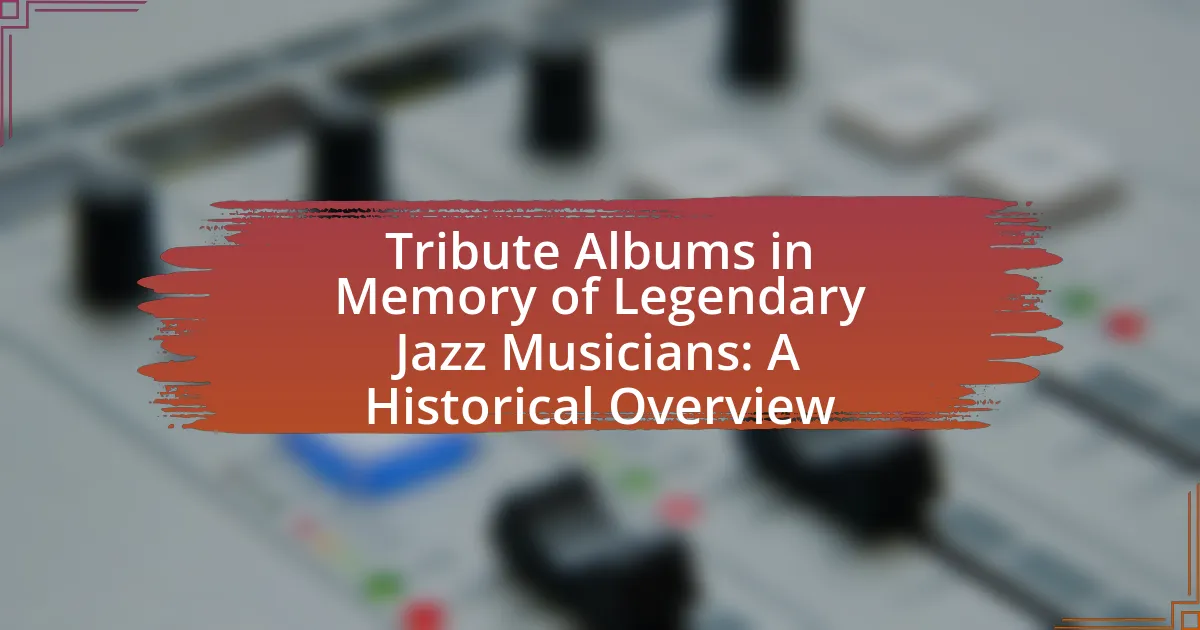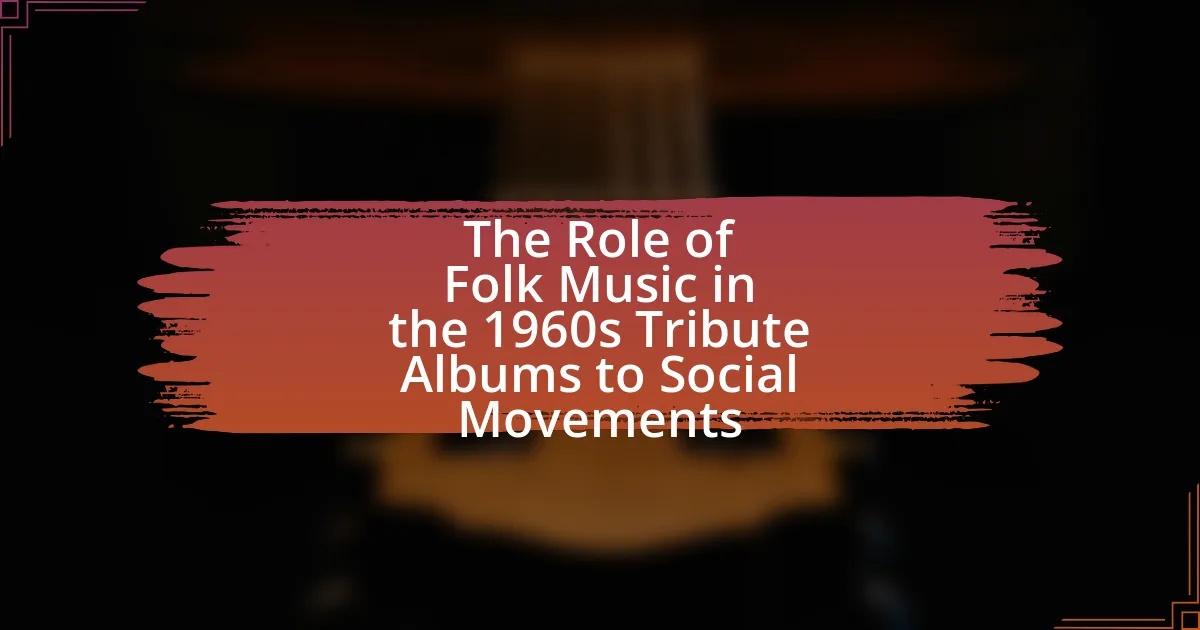Tribute albums are collections of songs recorded by various artists to honor specific musicians, bands, or genres, playing a crucial role in preserving musical legacies and introducing original works to new audiences. This article explores how tribute albums reflect cultural movements, particularly within the punk rock genre, highlighting their significance in honoring influential artists and fostering collaboration among contemporary musicians. It discusses the impact of the punk rock revolution on the creation of tribute albums, the importance of iconic punk bands in inspiring these projects, and the opportunities they provide for emerging artists. Additionally, the article examines notable tribute albums, their reception by fans and critics, and best practices for producing effective tribute albums.

What are Tribute Albums and Their Role in Music?
Tribute albums are collections of songs recorded by various artists to honor and pay homage to a specific musician, band, or genre. These albums serve multiple roles in music, including preserving the legacy of the original artists, introducing their work to new audiences, and fostering collaboration among contemporary musicians. For example, the tribute album “We’re a Happy Family: A Tribute to Ramones” features various artists covering songs by the influential punk band Ramones, thereby celebrating their impact on punk rock and ensuring their music reaches future generations. This practice not only highlights the original artists’ contributions but also showcases the evolving nature of music as newer artists reinterpret classic works.
How do Tribute Albums reflect cultural movements?
Tribute albums reflect cultural movements by serving as a medium for artists to reinterpret and honor the music that has shaped societal values and attitudes. In the context of the punk rock revolution, tribute albums highlight the genre’s influence on rebellion, individuality, and anti-establishment sentiments. For example, the album “Punk Goes Pop” showcases punk bands covering popular songs, illustrating how punk culture challenges mainstream norms while simultaneously engaging with them. This interaction underscores the cultural significance of punk rock as a response to social issues, such as political unrest and economic disparity, prevalent during its rise in the late 1970s and early 1980s. Thus, tribute albums not only preserve the legacy of influential artists but also reflect the ongoing dialogue between cultural movements and the music that embodies them.
What elements make a Tribute Album significant?
A tribute album is significant due to its ability to honor and reinterpret the work of influential artists, often reflecting cultural and musical movements. These albums typically feature various artists covering songs from a specific musician or band, showcasing the impact of the original work on contemporary music. For instance, the “Punk Goes Pop” series highlights how punk rock artists reinterpret popular songs, illustrating the genre’s evolution and influence. Additionally, tribute albums can serve as a historical record, preserving the legacy of the original artists while introducing their music to new audiences, as seen in the “We Are the World” project, which united diverse artists for a charitable cause.
How do Tribute Albums differ from regular albums?
Tribute albums differ from regular albums primarily in their purpose and content, as tribute albums are collections of songs that honor and reinterpret the work of a specific artist or band, while regular albums typically consist of original material created by the artist themselves. Tribute albums often feature various artists covering the songs of the honoree, showcasing diverse interpretations and styles, which contrasts with regular albums that present a cohesive vision from a single artist or group. For example, the tribute album “We’re a Happy Family: A Tribute to Ramones” includes multiple artists covering Ramones’ songs, highlighting their influence on punk rock, whereas a regular album by the Ramones would contain their original compositions.
Why are Tribute Albums important in the Punk Rock genre?
Tribute albums are important in the punk rock genre because they serve as a means of honoring and preserving the legacy of influential punk bands and artists. These albums allow new generations of musicians to reinterpret classic songs, thereby keeping the spirit of punk alive and relevant. For instance, the tribute album “Punk Goes Pop” showcases punk bands covering popular songs, which not only introduces punk rock to a broader audience but also highlights the genre’s adaptability and cultural impact. Additionally, tribute albums often foster a sense of community among fans and artists, reinforcing the collaborative ethos that is central to punk rock culture.
What impact do Tribute Albums have on the legacy of Punk Rock artists?
Tribute albums significantly enhance the legacy of Punk Rock artists by preserving their influence and introducing their music to new audiences. These albums often feature contemporary artists covering classic Punk tracks, which not only honors the original musicians but also revitalizes interest in their work. For instance, the tribute album “We’re a Happy Family: A Tribute to Ramones” released in 2003, showcased various artists and helped to reintroduce the Ramones’ music to younger generations, thereby solidifying their status as Punk icons. Additionally, tribute albums serve as a cultural artifact, reflecting the ongoing relevance of Punk Rock’s themes of rebellion and individuality, which continue to resonate in modern music.
How do Tribute Albums contribute to the evolution of Punk Rock music?
Tribute albums contribute to the evolution of punk rock music by reinterpreting and revitalizing classic tracks, thereby introducing the genre to new audiences and fostering a sense of community among artists and fans. These albums often feature diverse interpretations from various punk and alternative bands, which can highlight the genre’s adaptability and influence across different musical styles. For instance, the tribute album “Punk Goes Pop” showcases punk bands covering popular songs, demonstrating how punk rock can engage with mainstream music while maintaining its core ethos. This interaction not only preserves the legacy of original punk artists but also inspires contemporary musicians to innovate within the genre, ensuring its ongoing relevance and evolution.

How did the Punk Rock Revolution influence Tribute Albums?
The Punk Rock Revolution significantly influenced tribute albums by encouraging a DIY ethos and a focus on authenticity in music. This movement, which emerged in the 1970s, emphasized raw sound and anti-establishment themes, leading tribute albums to reflect these values through their production styles and artist selections. For instance, tribute albums often feature a diverse range of artists covering punk classics, showcasing the genre’s impact on various musical styles and communities. The success of tribute albums like “Punk Goes Pop” demonstrates how punk’s rebellious spirit continues to inspire reinterpretations of mainstream songs, reinforcing the genre’s lasting legacy in contemporary music culture.
What key events in the Punk Rock Revolution shaped Tribute Albums?
The key events in the Punk Rock Revolution that shaped Tribute Albums include the emergence of influential bands like The Ramones and Sex Pistols in the 1970s, which established a raw, rebellious sound that inspired subsequent generations. The release of tribute albums, such as “We’re a Happy Family: A Tribute to the Ramones” in 2003, reflects the lasting impact of these bands on music culture. Additionally, the DIY ethos of punk encouraged artists to reinterpret and pay homage to their influences, leading to a proliferation of tribute albums that celebrate punk’s legacy. The cultural significance of punk rock, marked by its anti-establishment messages and grassroots movements, directly influenced the thematic and stylistic choices in these tribute projects.
How did the DIY ethic of Punk Rock affect the creation of Tribute Albums?
The DIY ethic of Punk Rock significantly influenced the creation of Tribute Albums by promoting a culture of independence and self-production among musicians. This ethos encouraged artists to reinterpret and pay homage to their influences without relying on major record labels, leading to a diverse array of tribute albums that reflect the raw, unfiltered spirit of punk. For instance, the tribute album “Punk Goes Pop,” which features punk bands covering popular songs, exemplifies how the DIY approach allows for creative freedom and innovation, showcasing the artists’ unique styles while honoring the original works. This trend highlights the punk community’s commitment to authenticity and grassroots collaboration, further solidifying the impact of the DIY ethic on the music industry.
What role did iconic Punk bands play in inspiring Tribute Albums?
Iconic Punk bands played a crucial role in inspiring Tribute Albums by establishing a raw, rebellious ethos that resonated with subsequent generations of musicians. The influence of bands like The Ramones, Sex Pistols, and The Clash set a precedent for the DIY approach in music, encouraging artists to reinterpret and pay homage to their work. This is evident in various tribute albums, such as “We’re a Happy Family,” which features covers of Ramones songs by diverse artists, showcasing the enduring impact of Punk’s simplicity and energy. The cultural significance of these bands has led to a proliferation of tribute projects that celebrate their legacy, reinforcing the idea that Punk’s revolutionary spirit continues to inspire new interpretations and creative expressions in music.
How do Tribute Albums serve as a platform for new artists?
Tribute albums serve as a platform for new artists by providing them exposure and opportunities to showcase their talent through established songs. These albums often feature covers of popular tracks by iconic bands, allowing emerging musicians to reach wider audiences who are already fans of the original artists. For instance, tribute albums like “Punk Goes Pop” have successfully introduced new artists to listeners who may not have discovered them otherwise, as they reinterpret well-known songs in a fresh context. This exposure can lead to increased visibility, potential fan engagement, and opportunities for further collaborations or performances, ultimately aiding in the new artists’ career development within the music industry.
What opportunities do Tribute Albums provide for emerging Punk bands?
Tribute albums provide emerging punk bands with exposure, networking opportunities, and a platform to showcase their talent. By participating in tribute albums, these bands can reach a wider audience that is already familiar with the original artists, thereby increasing their visibility in the music scene. Additionally, tribute albums often involve collaborations with established artists, allowing emerging bands to build valuable connections within the industry. This exposure can lead to increased fan engagement and potential performance opportunities, as tribute albums often attract attention from media outlets and music festivals.
How do Tribute Albums help preserve the Punk Rock sound for future generations?
Tribute albums help preserve the Punk Rock sound for future generations by reinterpreting classic tracks and introducing them to new audiences. These albums often feature contemporary artists covering iconic punk songs, which not only revitalizes the original music but also contextualizes it within modern musical landscapes. For instance, the tribute album “Punk Goes Pop” showcases punk bands covering popular songs, bridging generational gaps and maintaining the punk ethos. This practice ensures that the raw energy and rebellious spirit of punk rock remain relevant, allowing future listeners to experience its cultural significance. Additionally, tribute albums serve as a historical record, documenting the influence of punk rock and its evolution over time, thereby solidifying its legacy in music history.

What are some notable Tribute Albums in Punk Rock history?
Some notable tribute albums in punk rock history include “We’re a Happy Family: A Tribute to Ramones,” released in 2003, which features various artists covering songs by the influential band Ramones. Another significant album is “Punk Goes Pop,” a series that began in 2000, showcasing punk bands covering popular pop songs, reflecting the genre’s adaptability. Additionally, “Take Action! Volume 1,” released in 2004, features covers by punk bands and supports charitable causes, highlighting the community aspect of punk rock. These albums demonstrate the impact and legacy of punk rock through reinterpretation and homage.
Which Tribute Albums have had the most significant impact on the genre?
The tribute albums that have had the most significant impact on the punk rock genre include “Punk Goes Pop,” “We’re a Happy Family: A Tribute to Ramones,” and “Take Action! Vol. 1.” “Punk Goes Pop,” released in 2002, showcased punk bands covering popular songs, bridging the gap between mainstream and punk music, and introducing punk to a broader audience. “We’re a Happy Family,” released in 2003, honored the Ramones, influencing a new generation of punk musicians and fans by highlighting the Ramones’ legacy. “Take Action! Vol. 1,” released in 2004, combined punk music with charitable causes, further solidifying the genre’s cultural relevance and community engagement. These albums collectively shaped the punk rock landscape by promoting collaboration, honoring influential artists, and expanding the genre’s reach.
What themes are commonly explored in these Tribute Albums?
Common themes explored in tribute albums include nostalgia, homage, and cultural impact. Nostalgia is prevalent as these albums often evoke memories of the original artists and their influence on the punk rock genre. Homage is expressed through reinterpretations of classic tracks, showcasing respect for the original musicians and their contributions. Cultural impact is highlighted by the way these albums reflect the socio-political messages inherent in punk rock, addressing issues such as rebellion, identity, and social justice. For instance, tribute albums often feature covers of songs that originally challenged societal norms, reinforcing the enduring relevance of punk rock’s themes.
How have these Tribute Albums been received by fans and critics?
Tribute albums have generally received a mixed reception from fans and critics. While some fans appreciate the homage to their favorite punk rock artists, critics often highlight inconsistencies in quality and authenticity. For instance, a review from Pitchfork noted that while certain tracks capture the spirit of the original songs, others fail to resonate, leading to a polarized response. Additionally, fan forums frequently discuss the emotional connection these albums evoke, yet they also express disappointment when the covers do not meet expectations set by the originals. This duality in reception underscores the complexity of tribute albums within the punk rock genre.
What lessons can be learned from the success of Tribute Albums?
The success of tribute albums demonstrates the importance of honoring musical legacies while fostering community engagement. Tribute albums often revive interest in original artists, as seen with “We Are the World,” which not only raised funds but also brought together diverse artists, showcasing the power of collaboration. Additionally, they highlight the adaptability of music genres; for instance, punk rock tribute albums have introduced classic punk songs to new audiences, proving that reinterpretation can breathe new life into established works. This phenomenon is supported by sales data indicating that tribute albums frequently perform well commercially, reflecting their resonance with both fans and new listeners.
How can artists effectively create their own Tribute Albums?
Artists can effectively create their own Tribute Albums by selecting a cohesive theme that resonates with the original artist’s style and message. This involves researching the original artist’s discography, understanding their influence on the genre, and choosing songs that reflect their impact. For instance, artists can analyze the emotional and cultural significance of the original tracks, ensuring that the covers maintain the essence while adding a personal touch.
Additionally, collaborating with other musicians who share a similar appreciation for the original artist can enhance the album’s authenticity and diversity. Historical examples include tribute albums like “We’re a Happy Family: A Tribute to Ramones,” which featured various artists interpreting Ramones’ songs, showcasing the punk rock spirit while honoring the band’s legacy. This approach not only pays homage but also introduces the original music to new audiences, reinforcing the cultural relevance of the tribute.
What best practices should be followed when producing a Tribute Album?
When producing a Tribute Album, it is essential to ensure authenticity and respect for the original artists while incorporating diverse interpretations. Authenticity can be achieved by selecting artists who genuinely admire the original work, as this fosters a sincere tribute that resonates with fans. Additionally, including a variety of musical styles can showcase the influence of the original artists across genres, appealing to a broader audience.
Moreover, securing the rights and permissions from the original artists or their estates is crucial to avoid legal issues and maintain the integrity of the project. Collaborating with producers who have experience in tribute albums can enhance the quality of the recordings and arrangements, ensuring that the final product honors the original material while offering fresh perspectives.
Finally, effective marketing strategies that highlight the tribute’s purpose and the artists involved can significantly impact its reception, as seen in successful tribute albums like “We Are the 80s,” which celebrated the music of that era while attracting both nostalgic listeners and new fans.




